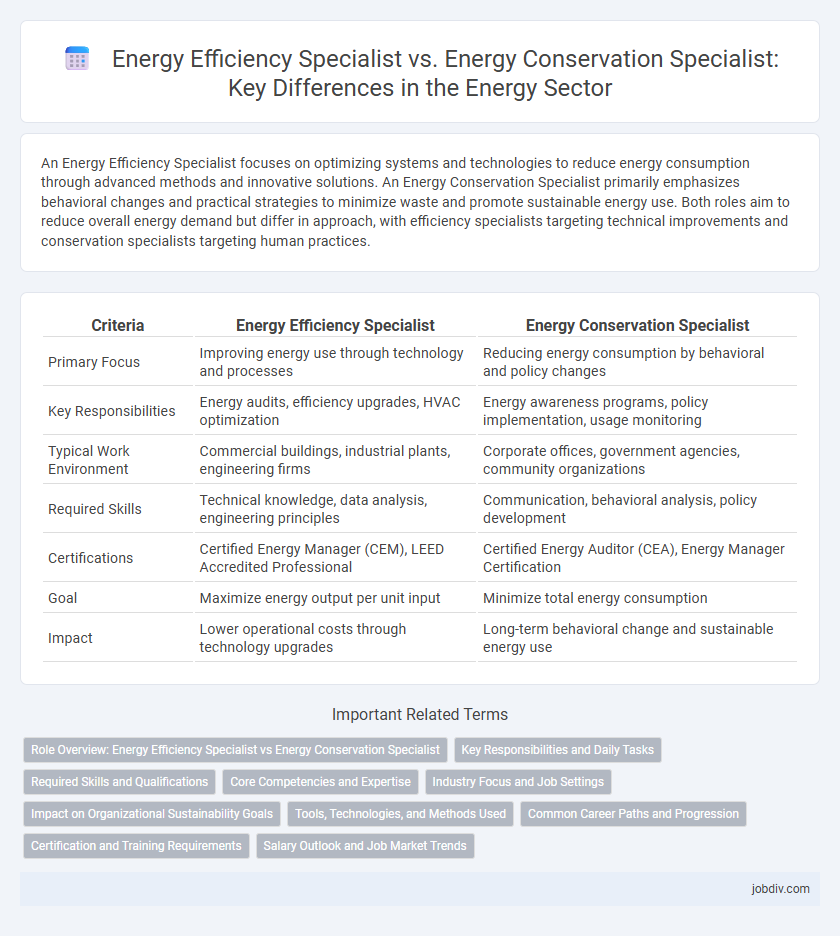An Energy Efficiency Specialist focuses on optimizing systems and technologies to reduce energy consumption through advanced methods and innovative solutions. An Energy Conservation Specialist primarily emphasizes behavioral changes and practical strategies to minimize waste and promote sustainable energy use. Both roles aim to reduce overall energy demand but differ in approach, with efficiency specialists targeting technical improvements and conservation specialists targeting human practices.
Table of Comparison
| Criteria | Energy Efficiency Specialist | Energy Conservation Specialist |
|---|---|---|
| Primary Focus | Improving energy use through technology and processes | Reducing energy consumption by behavioral and policy changes |
| Key Responsibilities | Energy audits, efficiency upgrades, HVAC optimization | Energy awareness programs, policy implementation, usage monitoring |
| Typical Work Environment | Commercial buildings, industrial plants, engineering firms | Corporate offices, government agencies, community organizations |
| Required Skills | Technical knowledge, data analysis, engineering principles | Communication, behavioral analysis, policy development |
| Certifications | Certified Energy Manager (CEM), LEED Accredited Professional | Certified Energy Auditor (CEA), Energy Manager Certification |
| Goal | Maximize energy output per unit input | Minimize total energy consumption |
| Impact | Lower operational costs through technology upgrades | Long-term behavioral change and sustainable energy use |
Role Overview: Energy Efficiency Specialist vs Energy Conservation Specialist
Energy Efficiency Specialists focus on optimizing systems and processes to reduce energy consumption through advanced technologies and performance monitoring. Energy Conservation Specialists emphasize behavioral change and policy implementation to encourage reduced energy use across residential, commercial, and industrial settings. Both roles contribute to sustainability, but Energy Efficiency Specialists leverage engineering solutions while Energy Conservation Specialists drive awareness and regulatory compliance.
Key Responsibilities and Daily Tasks
Energy Efficiency Specialists analyze building systems and implement advanced technologies to reduce energy consumption and optimize performance through data-driven audits and system upgrades. Energy Conservation Specialists focus on promoting sustainable energy use by developing and enforcing policies, conducting awareness programs, and monitoring conservation initiatives to encourage behavioral changes. Both roles require expertise in energy management, but Efficiency Specialists emphasize technical optimization while Conservation Specialists prioritize policy implementation and stakeholder engagement.
Required Skills and Qualifications
Energy Efficiency Specialists require expertise in energy auditing, data analysis, and knowledge of building systems to optimize energy use effectively. Energy Conservation Specialists focus on developing and implementing strategies that reduce energy consumption, requiring skills in behavioral science, project management, and regulatory compliance. Both roles demand a strong understanding of energy codes, sustainability principles, and proficiency with energy modeling software.
Core Competencies and Expertise
Energy Efficiency Specialists focus on optimizing energy use through advanced technology integration, energy audits, and implementing energy management systems to reduce consumption and costs. Energy Conservation Specialists emphasize behavioral change, education programs, and policy development to promote sustainable energy habits and community-wide resource preservation. Both roles require expertise in energy regulations, data analysis, and project management, but Efficiency Specialists typically leverage technical solutions while Conservation Specialists prioritize human factors and organizational strategies.
Industry Focus and Job Settings
Energy Efficiency Specialists primarily work in industrial and commercial sectors, optimizing systems and processes to reduce energy consumption while maintaining productivity. Energy Conservation Specialists often focus on residential and public sector projects, implementing strategies that encourage sustainable energy use and resource management. Both roles collaborate with engineers and facility managers but differ in target environments, with efficiency specialists emphasizing technical upgrades and conservation specialists prioritizing behavior change and policy compliance.
Impact on Organizational Sustainability Goals
Energy Efficiency Specialists focus on optimizing energy use through technical solutions and system improvements, directly reducing operational costs and carbon emissions. Energy Conservation Specialists emphasize behavior change and policy development to promote sustainable energy consumption patterns within organizations. Both roles significantly contribute to organizational sustainability goals by minimizing environmental impact and enhancing long-term energy resource management.
Tools, Technologies, and Methods Used
Energy Efficiency Specialists utilize advanced technologies such as building energy modeling software, smart meters, and HVAC optimization tools to analyze and improve energy consumption. Energy Conservation Specialists focus on behavioral and operational methods like energy audits, manual monitoring systems, and employee training programs to reduce energy use. Both specialties employ data analytics and real-time monitoring but differ in their emphasis on technological integration versus conservation practices.
Common Career Paths and Progression
Energy Efficiency Specialists often advance by gaining expertise in building systems, energy audits, and sustainability certifications, leading to roles such as Energy Manager or Sustainability Consultant. Energy Conservation Specialists typically progress through experience in policy development, project implementation, and regulatory compliance, moving towards positions like Environmental Compliance Manager or Energy Policy Advisor. Both career paths offer growth through continuous education and specialization in emerging technologies and energy management software.
Certification and Training Requirements
Energy Efficiency Specialists typically require certifications such as Certified Energy Manager (CEM) or LEED Accreditation, reflecting expertise in optimizing energy use in buildings and systems. Energy Conservation Specialists often pursue training in behavioral change strategies and may hold certifications like Certified Energy Auditor (CEA) to focus on reducing overall energy consumption. Both roles demand continuous education on current energy codes, sustainability practices, and emerging technologies to maintain industry-standard competencies.
Salary Outlook and Job Market Trends
Energy Efficiency Specialists typically command higher salaries due to their expertise in advanced technologies and data analytics that optimize building performance, with average annual earnings ranging from $65,000 to $90,000. Energy Conservation Specialists, focused more on behavior-driven and policy-based strategies, see salaries generally between $50,000 and $75,000, reflecting their growing role in sustainability programs. Job market trends indicate increasing demand for Energy Efficiency Specialists in commercial and industrial sectors, while Energy Conservation Specialists remain essential in public policy and community engagement initiatives.
Energy Efficiency Specialist vs Energy Conservation Specialist Infographic

 jobdiv.com
jobdiv.com